Over 80 Percent of Patients with COVID-19 Have Vitamin D Deficiency, Research Reveals
A new study published in the Endocrine Society's Journal of Clinical Endocrinology & Metabolism shows that more than 80 percent of 200 patients with COVID-19 admitted at a hospital in Spain is reported to have vitamin D deficiency.
Vitamin D is a hormone produced by the kidney that controls the concentration of blood calcium and affects the immune system.
Vitamin D deficiency is associated with various health concerns even though the study is still underway into the reason the hormone is affecting the body's other systems.
Several studies point to the beneficial impacts of vitamin D on the immune system, specifically on the shield from infections.
According to study co-author Jose Hernandez, Ph.D., from the University of Cantabria, one approach is to determine and treat Vitamin D deficiency, particularly in high-risk populations like the older adults, "patients with comorbidities" and residents of nursing homes-the main target populaces for COVID-19.
ALSO READ: Researchers Find a Correlation Between Zinc Deficiency and Poor COVID-19 Outcomes

A new study shows that more than 80 percent of 200 patients with COVID-19 admitted at a hospital in Spain is reported to have vitamin D deficiency.
Recommended in COVID-19 Patients
Hernandez also said, "Vitamin D treatment should be recommended COVID-19 patients" who have low vitamin D levels circulating in their blood. This approach might have beneficial effects on the patients, both musculoskeletal and immune systems.
Specifically, the study authors found that 80 percent of the 2016 patients with COVID-19 who are admitted at the Hospital Universitario Marqués de Valdecilla lacked vitamin D.
They also specified in their research that men had lower levels of vitamin D compared to women. More so, COVID-19 patients who were found to have lower levels of vitamin D "had raised serum levels of inflammatory markers" like ferritin and D-dimer.
Vitamin D Deficiency
Several experts cite a 2017 study as conditional evidence showing vitamin D may have a shielding effect against COVID-19.
Their articles have been featured in different journals like The Lancet Diabetes & Endocrinology and Aging Clinical and Experimental Research, among others.
These experts say the common thread is that they emphasize that adequate levels of vitamin D may help the immune systems combat COVID-19, as other infections that cause upper respiratory infections.
As a result, people who have low levels of vitamin D may not be able to do this efficiently. As suggested by some scientists, one of the aspects of this is that it offers "an elegant excuse" why COVID-19 has unreasonably impacted individuals from marginalized ethnic and racial groups.
DON'T MISS THIS: COVID-19 Update: Recent Developments Regarding the Infectious Disease
Exposure to Sunlight
There has already been evidence suggesting that people who have darker skin tones living in Northern latitudes have low levels of vitamin D.
To make the particular vitamin, experts suggest that the body converts a "metabolite of cholesterol in the skin cells" into an active vitamin D form when one is exposed to sunline, especially to UVB or ultraviolet light.
This inactive form then goes through a more extensive chemical medication in the kidneys and liver. Furthermore, the pigment melanin that provides the skin color blocks the UVB light from penetrating the cells.
Therefore, the darker the skin of a person, the more UVB light is needed to make sufficient vitamin D levels from the sun alone.
IN CASE YOU MISSED IT: Case Report at Children's National Hospital Raises Concern for Resistance to Antibiotic
Check out more news and information on COVID-19 on MD News Daily.
Oct 28, 2020 12:00 PM EDT




